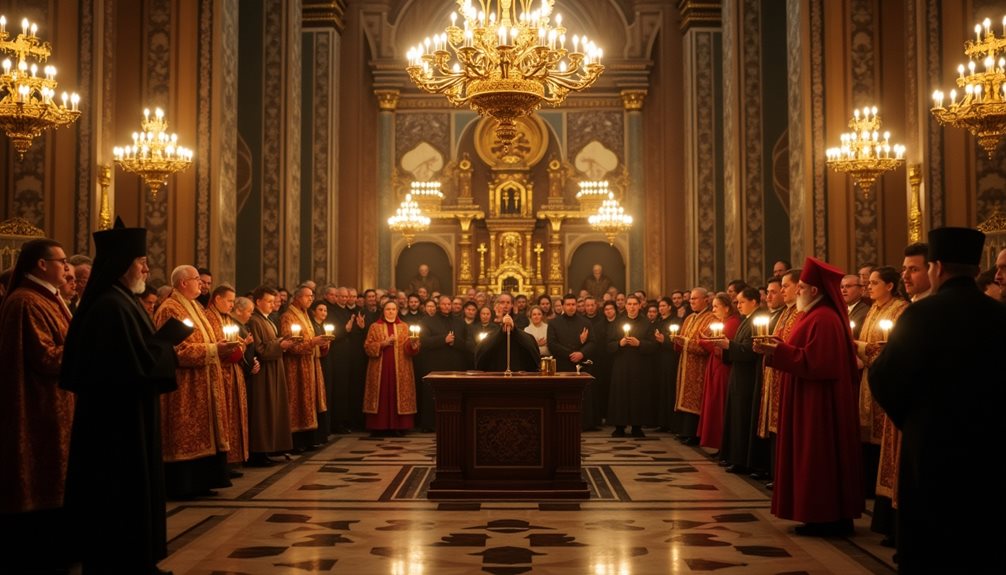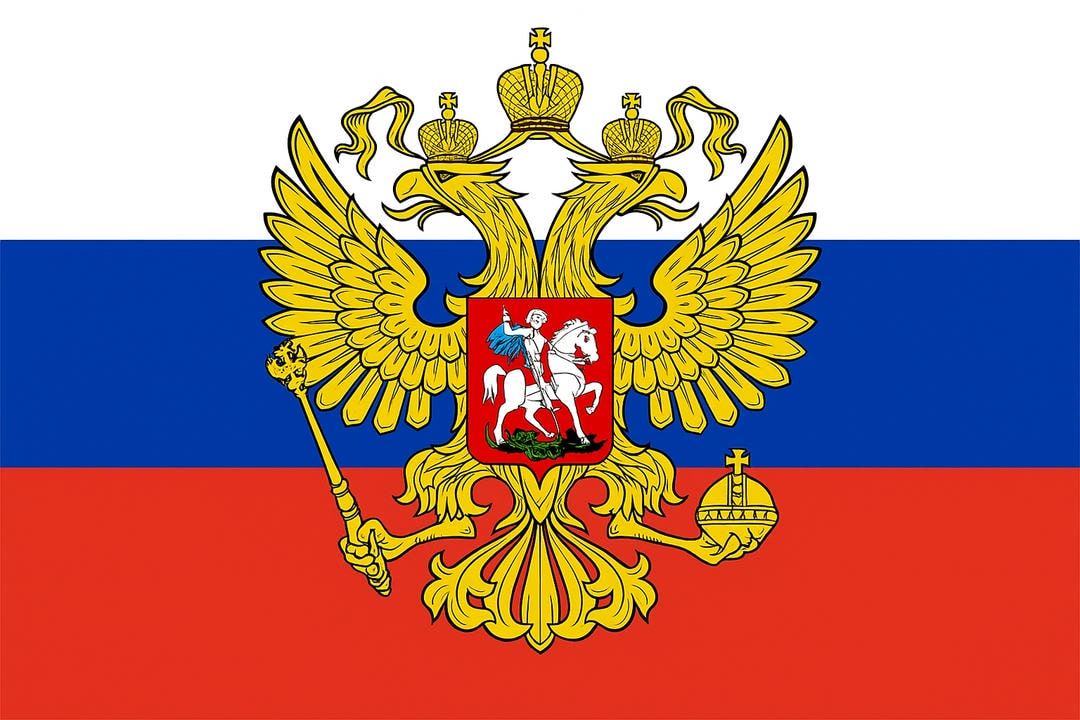Structure of the School System
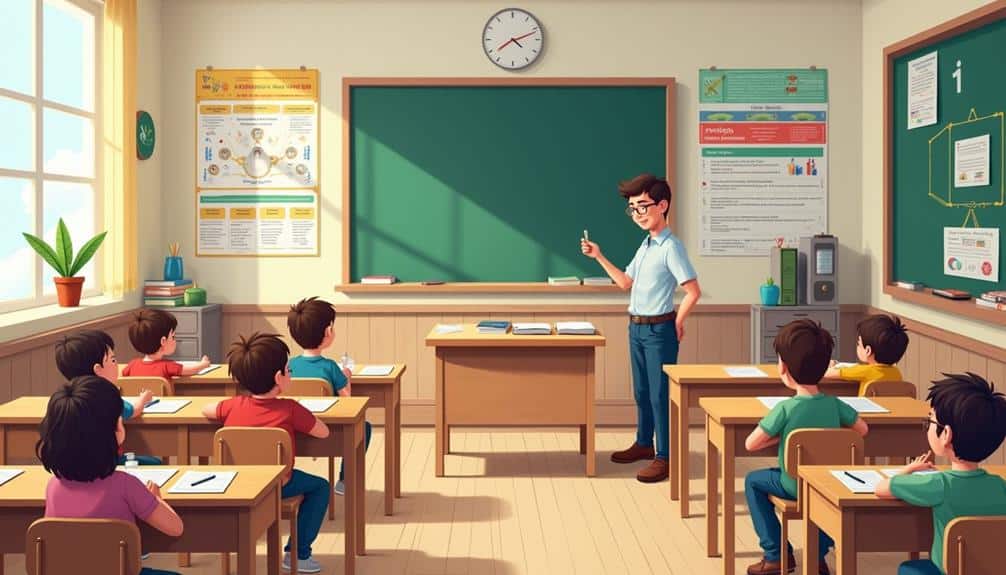
The Russian school system is structured into a detailed 11-year program that is designed to provide a robust educational foundation for students. The framework is divided into three distinct stages: primary, basic general, and secondary general education. This structure guarantees a thorough and consistent approach to learning, catering to students’ academic and developmental needs.
The initial stage, primary education, spans four years, followed by basic general education, which covers five years. These stages collectively focus on building core competencies across various subjects, including science, mathematics, literature, and physical education. Students are encouraged to develop critical thinking and problem-solving skills, essential for personal and intellectual growth.
The final stage, secondary general education, lasts two years and emphasizes specialized learning. During this phase, students have the opportunity to choose subjects that align with their interests and future career aspirations. This flexibility allows them to cultivate a sense of autonomy and pursue paths that resonate with their individual goals.
The structure of the Russian school system aims to equip students with the knowledge and skills necessary to navigate an increasingly complex world, fostering a sense of empowerment and readiness to embrace future challenges.
Primary Education
Initiating with primary education, Russian schools lay the foundation for students’ academic journey through an extensive four-year program. This initial stage is vital for developing core competencies in literacy, numeracy, and basic sciences. Children typically enter primary education at the age of six or seven, starting on a curriculum that emphasizes thorough learning and critical thinking.
The primary education curriculum in Russia is meticulously crafted to guarantee a balanced development of intellectual and social skills. Key subjects include Russian language, mathematics, natural sciences, social studies, art, and physical education.
Teachers employ a blend of traditional and innovative methodologies to engage students, fostering an environment where curiosity and independent thought are encouraged.
Moreover, the Russian primary education system places a significant emphasis on fostering a sense of discipline and responsibility. Classrooms are structured to support collaborative learning while also allowing individual exploration.
This approach aims to cultivate a well-rounded character, equipping students with the essential tools for future academic endeavors.
In essence, primary education in Russia is designed not just to impart knowledge, but to inspire a lifelong passion for learning, setting the stage for personal and intellectual freedom.
Middle School Years
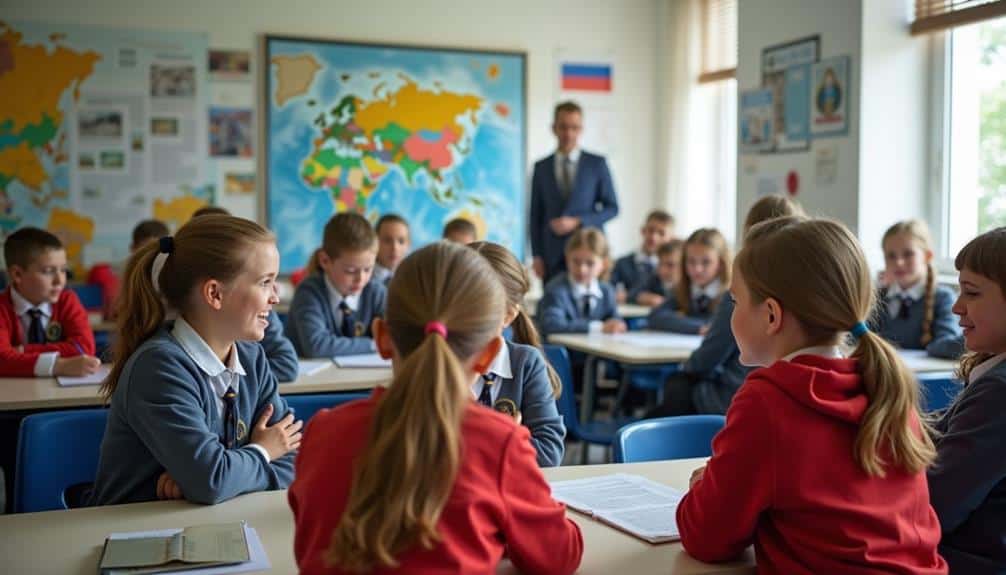
Shifting from primary education, students in Russia enter the middle school years around the age of 10 or 11. This phase, covering grades 5 through 9, marks a significant shift as it introduces a broader and more rigorous curriculum. The subjects expand to include specialized studies in areas such as physics, chemistry, and foreign languages, alongside continued instruction in mathematics, literature, and history.
Middle school education in Russia is designed to cultivate a deeper understanding of various disciplines while fostering critical thinking and analytical skills. Teachers play a pivotal role, adapting their instructional strategies to engage students actively and encourage independent thought.
Additionally, this period emphasizes the development of personal responsibility, preparing students for the challenges of more advanced academic pursuits.
Extracurricular activities also gain prominence during these years. Students are encouraged to participate in sports, arts, and various clubs, which not only enhance their social skills but also provide a well-rounded educational experience.
The aim is to nurture a generation of well-informed and versatile individuals who can navigate the complexities of an ever-changing world.
Secondary Education
As students complete their middle school years, they then advance into the secondary education phase, which comprises grades 10 and 11. This stage is essential, serving as the bridge between foundational learning and higher education or vocational training.
During these two significant years, students are offered a more focused and in-depth educational experience. They are provided with opportunities to specialize in subjects that align with their academic strengths and career aspirations.
Secondary education in Russia aims to cultivate independent thinking, problem-solving skills, and in-depth knowledge in selected disciplines. It is designed to empower students with the freedom to explore diverse academic fields, thereby fostering a culture of intellectual curiosity and self-directed learning.
This phase also encourages students to take on more responsibility for their educational journey, promoting a sense of autonomy and personal growth.
Curriculum Overview
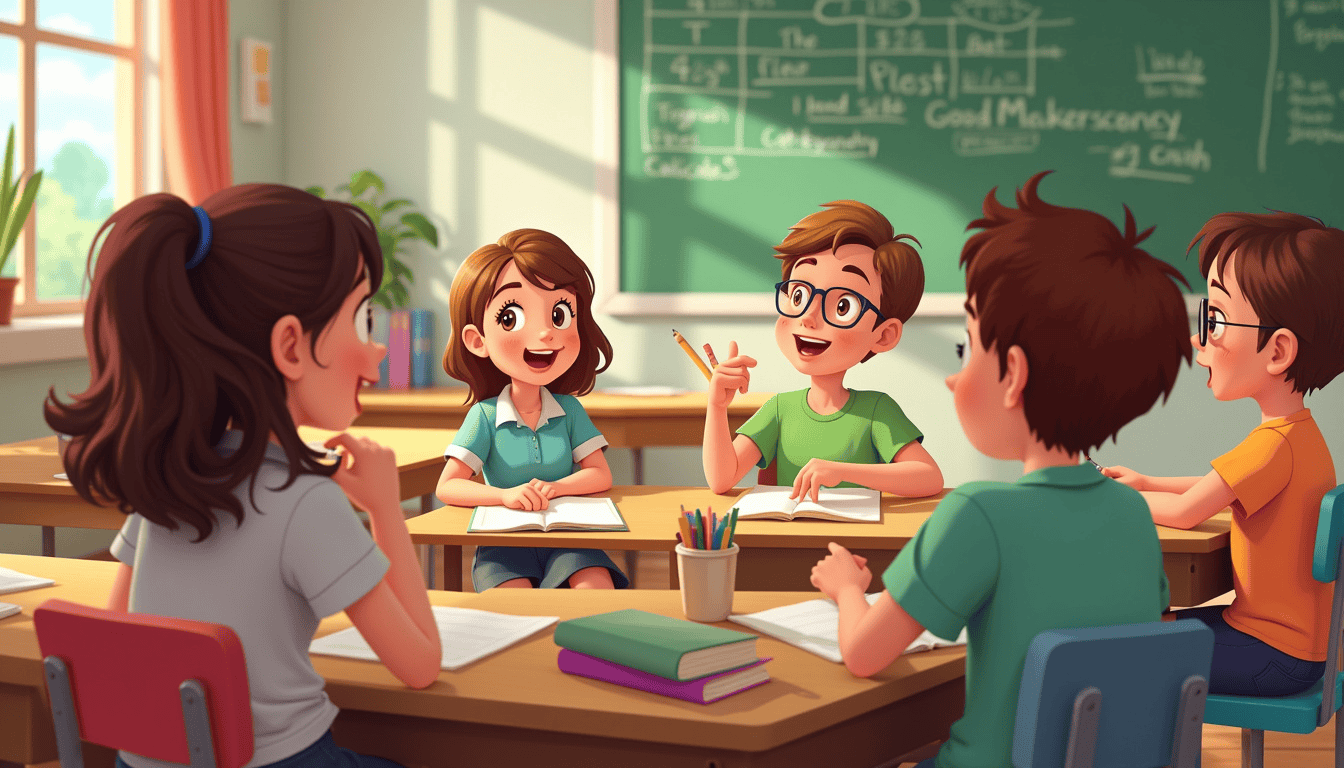
The curriculum for Russia’s secondary education is meticulously structured to provide a thorough and rigorous academic experience. It is designed to cultivate a broad spectrum of knowledge and skills, guaranteeing that students receive a well-rounded education that prepares them for both higher education and the professional world.
Core subjects such as mathematics, science, and Russian literature form the backbone of the curriculum. These are complemented by social studies, history, and a foreign language, typically English, to foster global awareness and communication skills.
Special emphasis is placed on STEM (Science, Technology, Engineering, and Mathematics) education, reflecting a national priority to nurture future innovators and technologists. Students also engage in physical education and arts, contributing to their overall development and encouraging a balanced lifestyle.
Instruction in the Russian language and literature guarantees cultural continuity and the preservation of national heritage. Meanwhile, elective subjects offer students the freedom to explore individual interests and talents, providing a tailored educational experience.
This structured yet flexible approach guarantees that learners are not only academically proficient but also adaptable and ready to face the challenges of a rapidly evolving world.
Extracurricular Activities
Extracurricular activities in Russia’s 11-year school system play an essential role in the holistic development of students. These activities extend beyond the classroom, offering a diverse range of opportunities that foster personal growth, creativity, and social skills. Students can engage in sports, arts, music, and various clubs that cater to different interests and talents.
Sports programs, including basketball, soccer, and gymnastics, promote physical health and teamwork. Cultural activities, such as drama clubs and art classes, provide a platform for creative expression and enhance cultural awareness. Music education is widespread, with many schools offering choir, orchestra, and individual instrument lessons, nurturing musical talent and discipline.
Additionally, academic clubs in subjects like mathematics, science, and literature encourage intellectual exploration and critical thinking. These clubs often participate in competitions, fostering a spirit of healthy rivalry and academic excellence. Language clubs and international exchange programs broaden students’ global perspectives and communication skills.
Extracurricular activities are not merely optional; they are integral to the Russian education system’s mission to produce well-rounded individuals. By offering students the freedom to explore their interests, these programs contribute greatly to their overall development, preparing them for future academic and professional endeavors.
Special Education Programs
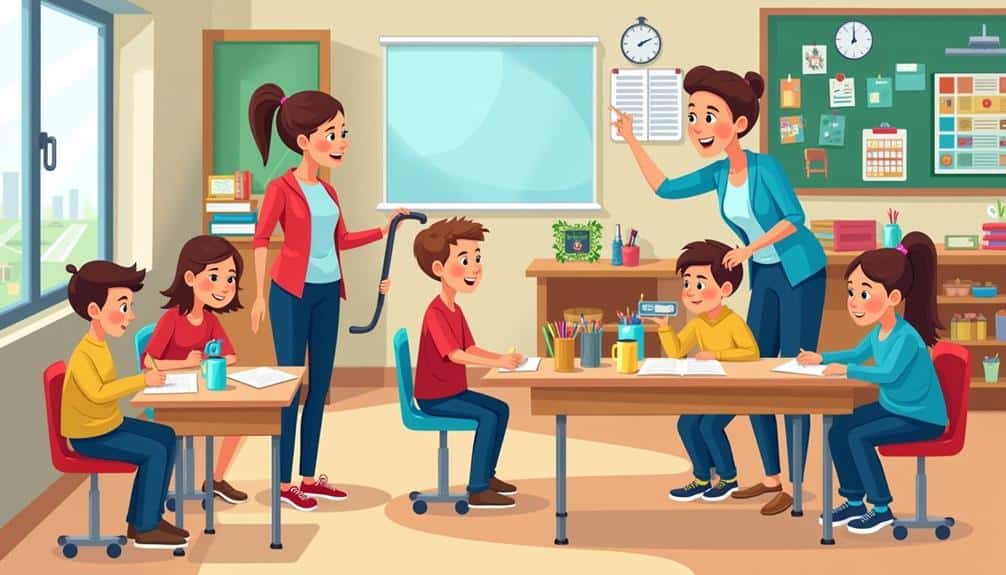
Building on the foundation of holistic development through extracurricular activities, Russia’s 11-year school system also places a strong emphasis on special education programs designed to meet the diverse needs of students. Recognizing that each student is unique, Russian schools have implemented a range of initiatives to support children with disabilities and learning difficulties. These programs are tailored to provide an inclusive education environment that fosters individual growth and academic achievement.
Special education in Russia encompasses services such as speech therapy, occupational therapy, and psychological support. Educators are trained to use adaptive teaching methods and specialized equipment to guarantee that all students have the opportunity to succeed.
The integration of these programs within mainstream schools allows for a more inclusive society, promoting mutual respect and understanding among students of varying abilities.
Moreover, the curriculum for special education is designed in collaboration with healthcare professionals and psychologists to address the specific needs of each child. This multi-disciplinary approach guarantees that students receive thorough support, enabling them to reach their full potential.
School Facilities and Resources
Recognizing the importance of a conducive learning environment, school facilities and resources in Russia’s 11-year school system are designed to support thorough educational experiences. Schools are equipped with modern classrooms, libraries, science laboratories, and computer rooms, fostering a culture of inquiry and discovery.
Emphasizing technological integration, schools often feature interactive whiteboards and access to digital resources, guaranteeing students can navigate and utilize contemporary information landscapes.
Physical education and extracurricular activities are also prioritized, with sports halls, gymnasiums, and outdoor fields available to promote physical well-being and teamwork. Artistic expression is encouraged through dedicated music rooms and art studios, enriching the holistic development of students.
Furthermore, specialized facilities for subjects such as language labs and vocational training rooms provide tailored environments to hone specific skills. Libraries, both physical and digital, serve as knowledge hubs, offering a vast array of resources supportive of independent study and research.
Access to quality resources is paramount, and efforts are continually made to guarantee that even schools in remote areas receive adequate support.
This extensive approach to school facilities and resources underscores Russia’s commitment to nurturing well-rounded, informed, and capable individuals prepared for the future.


